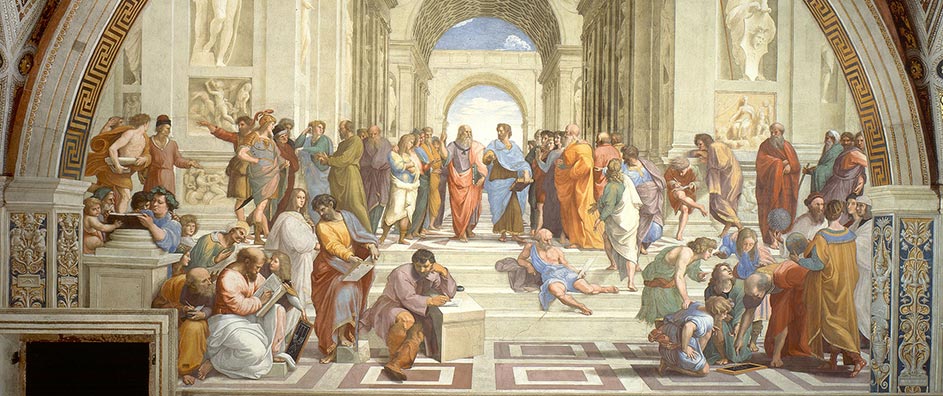The views expressed in our content reflect individual perspectives and do not represent the authoritative views of the Baha'i Faith.
“Man – a being in search of meaning.” – Plato
The philosophers who followed Plato, including Aristotle and the rest, all learned from their great teacher how he defined the meaning of life. Plato, and the doctrine of his Platonic school of philosophy, both hold that we human beings find meaning by searching for and attaining the highest form of knowledge.
Few people know that Plato had an actual school of philosophy, called the Akademia (Academy) just outside Athens in ancient Greece. He started his school in 387 BC and ran it until his death forty years later. Just about every great Greek philosopher attended. Before its use as a school and as far back as the Bronze Age, a sacred grove of olive trees dedicated to the Greek goddess of wisdom Athena grew on that land. The grove, despite being outside the city wall of Athens, was never attacked by the Spartans because of its sacred nature.
This Platonic Academy, of course, started the entire western tradition of academe. Even today, centers of learning have groves of trees and are seen as sanctuaries of learning protected from outside invasion. Because that early Greek culture made learning a sacred, protected activity, we do the same.
If Plato seems distant and foreign to you, just think of him this way: as the founder of mathematics. Because the theoretical and foundational aspects of modern math started with the Ancient Greeks; and because Platonic ideas form the basis for the pure abstractions necessary for algebra and geometry; most contemporary mathematicians evolved from Plato – which means all of our modern technology ultimately grew out of Plato’s remarkable mind.
The great philosopher’s central “Idea of the Good”, what Plato called his Theory of Forms, proposes that the highest form of knowledge we all naturally seek in life actually exists as an ultimate reality. Ideas and ideals are not abstractions, Plato said, but are the perfected forms of abstract objects, transcendent, perfect archetypes which exist in a “third realm distinct both from the sensible external world and from the internal world of consciousness.”
Plato, like his teacher Socrates and his student Aristotle, all believed in the existence of God. His “third realm,” many believe, refers to the spiritual world, a world beyond the illusions of forms, that realm of meaning we can only access through the human soul.
The Baha’i writings praise and elevate the great Greek philosophers and their philosophies:
The philosophers of Greece – such as Aristotle, Socrates, Plato and others – were devoted to the investigation of both natural and spiritual phenomena. In their schools of teaching they discoursed upon the world of nature as well as the supernatural world. Today the philosophy and logic of Aristotle are known throughout the world. Because they were interested in both natural and divine philosophy, furthering the development of the physical world of mankind as well as the intellectual, they rendered praiseworthy service to humanity. This was the reason of the triumph and survival of their teachings and principles. Man should continue both these lines of research and investigation so that all the human virtues, outer and inner, may become possible. The attainment of these virtues, both material and ideal, is conditioned upon intelligent investigation of reality, by which investigation the sublimity of man and his intellectual progress is accomplished. Forms must be set aside and renounced; reality must be sought. We must discover for ourselves where and what reality is. – Abdu’l-Baha, The Promulgation of Universal Peace, p. 327.
The Baha’i teachings encourage and exalt the human search for meaning. They take the Platonic ideal of an “intelligent investigation of reality” and extend it as a challenge, a responsibility and a privilege to every human being:
Furthermore, know ye that God has created in man the power of reason whereby man is enabled to investigate reality. God has not intended man to blindly imitate his fathers and ancestors. He has endowed him with mind or the faculty of reasoning by the exercise of which he is to investigate and discover the truth; and that which he finds real and true, he must accept. – Abdu’l-Baha, Foundations of World Unity, pp. 73-74.
For Baha’is, no greater joy exists than making meaning in life:
When the spiritually minded dive deeply into the ocean of their meaning they bring to the surface the pearls of their inner significance. – Abdu’l-Baha in London, p. 79.

















Comments
Sign in or create an account
Continue with Googleor